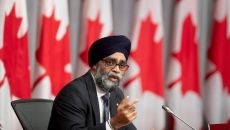The Bank of Canada says there are signs in the country's financial markets that suggest concern about the ability of companies to weather the COVID-19 economic crisis.
The central bank has spent the last two months making a flurry of policy decisions that has seen it slash its target interest rate and embark on an unprecedented bond-buying program to ease the flow of credit.
The report suggests these measures have helped ease liquidity strains and provide easy access to short-term credit for companies and households.
But it is warning this morning that a cash-flow problem for businesses seeing sharp revenue declines during the crisis could soon develop into a solvency issue.
The Bank of Canada's review of the country's financial system says market prices point to a concern that defaults are likely to rise.
The report also raises concerns that household debt levels are likely to rise and become acute for households whose incomes don't fully recover from the pandemic.
"We entered this global health crisis with a strong economy and resilient financial system. This will support the recovery," bank governor Stephen Poloz is quoted as saying in the review.
"But we know that debt levels are going to rise, so the right combination of economic policies will be important too."
Aside from what is now approaching $150 billion in direct federal aid, the central bank over the course of March alone slashed its target interest rate to 0.25 per cent from 1.75 per cent.
It has also snapped up federal bonds to effectively provide low-cost financing to Ottawa to cover a massive spike in spending.
The bank's balance sheet has more than tripled to $392 billion since early March, as part of an expansion larger and faster than during the financial crisis of 2008 and 2009 when its balance sheet increased by 50 per cent.
But the longer the economic shock from COVID-19 lasts, the more it drives the risks of consumer insolvencies, the central bank says.
The number of vulnerable households — those putting more than 40 per cent of their income to cover debt payments — "is likely to rise," the bank says, and fall behind on loan payments even with deferrals to some 700,000 households so far.
The central bank's review also suggests financial institutions may be much less capable of responding to and containing a cyber security incident while many employees work from home.
"There is evidence of increased phishing and malware attacks designed to take advantage of the growth in remote work and the public appetite for information related to COVID-19," the report said.
"Cyber criminals are also using public interest in new government support programs to lure users to malicious websites."






